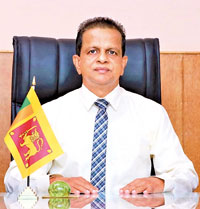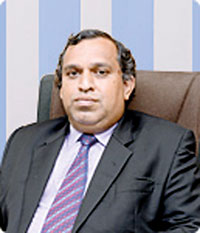News
Systemic problems hobble supplies of hundreds of medicines
View(s):
According to the Swastha database of the Ministry of Health, there is a shortage of around 300 essential medicines. Pic by Nilan Maligaspe
By Nathara Abeywickrema
Dr. Chamal Sanjeewa, president of the Medical and Civil Rights Professional Association, highlights some critical issues.

Dr. Chamal Sanjeewa
According to the Swastha database of the Ministry of Health, there is a shortage of around 300 essential medicines, including insulin, sodium bicarbonate, immunoglobulin, carboplatin, and irinotecan, which are crucial for treating diabetes, immunodeficiency, emergencies, and cancer.
He attributes this shortage to poor forecasting, inadequate planning, monopolies created by preferential drug registration practices, and a lack of transparency in procurement.
Dr. Sanjeewa is calling for the immediate automation of the drug regulatory authority’s data systems and reforms to ensure transparency in procurement.

Dr. Chamil Wijesinghe
Furthermore, he stresses the Health Minister’s accountability for systemic corruption, including counterfeit drug fraud and irregularities in procuring medical equipment like anti-cancer devices, urging thorough investigations into these issues.
Deputy Director General of the Medical Supplies Division (MSD), Dr. G. Wijesuriya, said that out of 865 medicines supplied by the division, nearly 150 are in short supply. However, he assured that the situation is being effectively managed.
“For instance, if Glucophage 500mg is unavailable, it is substituted with the 200mg variant to meet patient needs,” he explained, urging patients not to panic, as the shortages are under control and pose no immediate danger.
He said that the hepatitis B vaccine is in limited supply, with no registered suppliers in Sri Lanka.

Dr. G. Wijesuriya
Dr. Wijesuriya attributed these challenges to tender cancellations over quality assurance concerns and global supply chain priorities that favour larger and wealthier nations, leaving smaller countries like Sri Lanka at a disadvantage.
State Pharmaceuticals Corporation (SPC) General Manager K.M.D.R. Dassanayake said that negotiations with suppliers are underway to replenish stocks, but pharmaceuticals require a lead time as raw materials must be sourced and the drugs manufactured and shipped.

Shalintha Rodrigo, manager of operations at Union Chemists (Pte) Limited,
The process is further complicated for certain items due to the absence of registered suppliers with the NMRA, making procurement even more challenging, he added.
Shalintha Rodrigo, manager of operations at Union Chemists (Pte) Limited, said that there is no shortage of medicines in the private market. He attributed the shortages in the national supply to disruptions in the supply chain.
Media Secretary of the Government Medical Officers’ Association (GMOA), Dr. Chamil Wijesinghe, emphasised the urgent need for a systematic approach to address the national supply of medicine. He highlighted the importance of streamlining procurement, improving transparency, and ensuring effective coordination among stakeholders to prevent supply disruptions.

(SPC) General Manager K.M.D.R. Dassanayake
Dr. Wijesinghe said that a structured framework is essential to anticipate and manage shortages, make best use of resources, and maintain the quality of care for patients. Such measures, he noted, are crucial for building a resilient healthcare system capable of meeting the nation’s medical needs consistently.
Deputy Minister of Health Dr. Hansaka Wijemuni highlighted that weak institutional coordination within the health sector has slowed the drug supply system.
He noted that while multiple institutions are involved in pharmaceutical procurement, their collaboration with the Ministry of Health remains inadequate.
Dr. Wijemuni emphasised the need for high-quality, affordable essential medicines to be delivered on time, pointing out that many issues stem from poor initial coordination between government bodies and pharmaceutical suppliers.
He mentioned that discussions are taking place with key government institutions in the pharmaceutical sector, including the MSD, SPC, SPMC, and NMRA. He recognised the inefficiencies within these organisations, which he attributed to systemic issues stemming from past economic downturns and governance challenges.
These inefficiencies have impacted processes such as order management, tendering, and supplier coordination. To address these issues, weekly meetings are being held with officials from these institutions to ensure that corrective actions are taken.
“The impact of the measures we are implementing is expected to become evident by 2026,’’ he further assured.
He noted that for certain medicines, only one supplier is registered, highlighting inefficiencies within certain institutions responsible for processing and approving supplier applications. Efforts are underway to address these challenges, with the aim of streamlining the registration process and ensuring efficiency.
The existing system has been revamped to improve transparency, identifying medicines in short supply. Efforts are underway to stabilise the supply chain with a reduced reliance on local procurement.
He said that while these measures have been implemented through personal intervention, a systematic approach is essential to stabilise the pharmaceutical sector.
He pointed out that the current system fosters unnecessary wastage and underscored the urgent need for a more formal and efficient framework.
The best way to say that you found the home of your dreams is by finding it on Hitad.lk. We have listings for apartments for sale or rent in Sri Lanka, no matter what locale you're looking for! Whether you live in Colombo, Galle, Kandy, Matara, Jaffna and more - we've got them all!

